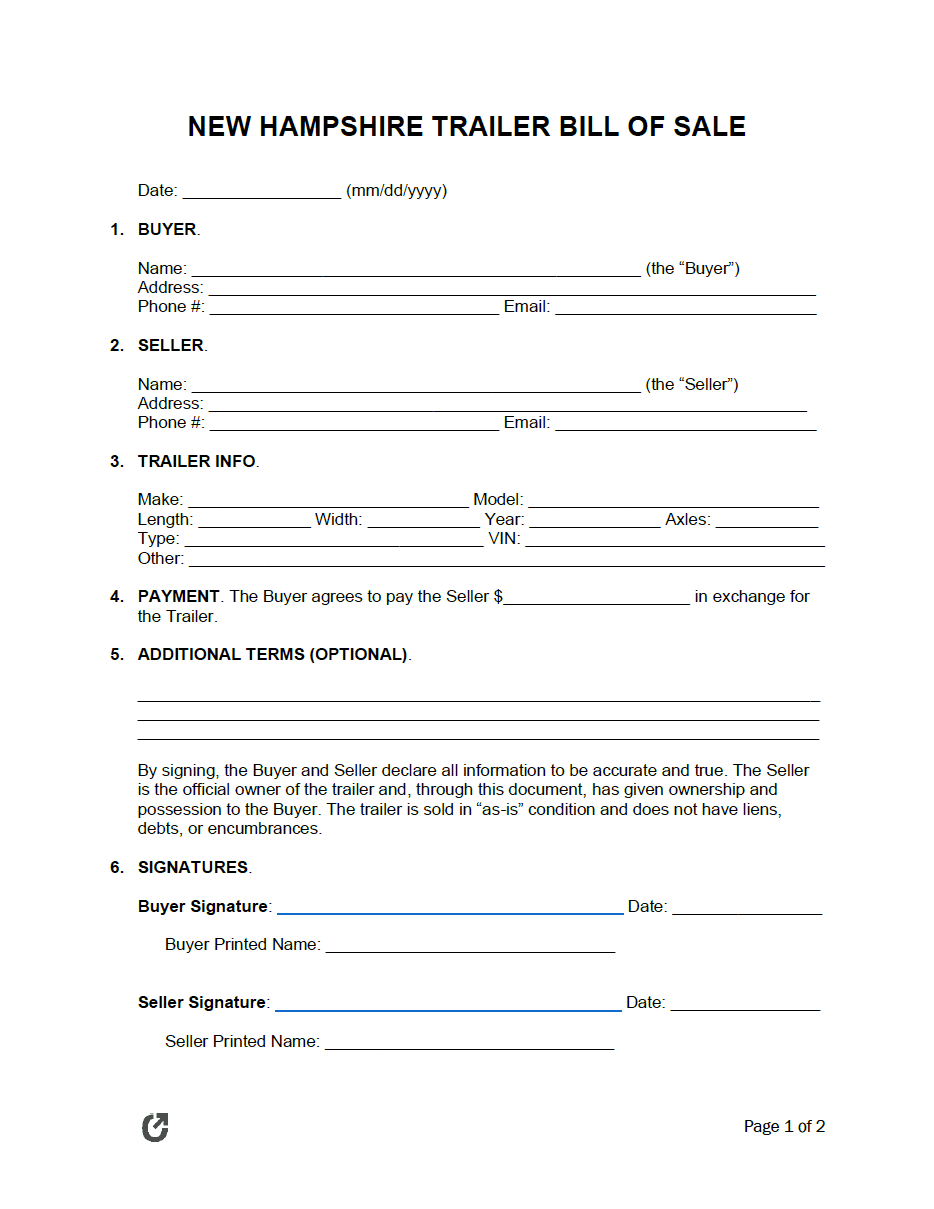New Hampshire Trailer Bill of Sale Form
A New Hampshire trailer bill of sale form recaps the basic details of a transaction involving a tow-behind. It acknowledges the purchase date, sale price, and the signatures of both parties, indicating each person’s agreement to the stated terms. Both parties must also list information to contact them after the transfer. Additionally, they must identify the trailer through its brand, type, dimensions, year, axles, vehicle identification number (VIN), and other key descriptors.
|
What is a New Hampshire Trailer Bill of Sale?
A New Hampshire trailer bill of sale removes the seller’s ownership and passes it onto the buyer. In addition to paying for the trailer, the transferee can receive the property by gift or trade. Both parties must record these extenuating circumstances in the form as they apply. Otherwise, the person completing the bill of sale must describe the trailer and enter the payment amount. The buyer signs to approve the information and accept the trailer in “as-is” condition. Similarly, the seller enters their signature to consent to the details, release their possession, and ascertain that no liens or debts exist.
How to Register a Trailer (3 Steps)
New Hampshire trailers require registration; however, not all need a title. Trailers weighing 3,000 pounds or more with a model year newer than 1999 need a title, while those under 3,000 pounds do not. Tow-behinds weighing over 10,000 pounds also require an inspection from an authorized dealer or mechanic.
Step 1 – Title
Trailers in New Hampshire need a title if they weigh 3,000 pounds or more and have the model year of 1999 or newer. Trailers under this weight limit require registration but not a title.
When purchasing new, the dealer provides the buyer with the title. Per state law, they must also give the individual 20-day temporary tags to operate the trailer while they wait for their standard plates. Residents buying a used trailer via private sale must bring the signed, completed title to their city or town clerk’s office to transfer it into their name.
If the trailer did not need a title in the past but needs it now, the owner must bring the original registration, a VIN verification form (TDMV 19A), and a signed bill of sale to their local office.
Step 2 – Registration
Owners of trailers weighing 3,000 pounds or more must bring the title or manufacturer’s certificate of origin (MCO) to their town or city clerk’s office for registration. If it has the model year of 1999 or older, the individual must also provide a signed bill of sale and a completed VIN verification form (TDMV 19A) or the seller’s registration.
Trailers weighing under 3,000 pounds require an original bill of sale that includes the VIN for registration. The owner must also provide a VIN verification form (TDMV 19A) or the seller’s registration if the document does not contain the VIN.
Once the owner provides the necessary documentation and payment, the state gives them a registration plate, which they must attach to the trailer. The driver must have insurance on the towing vehicle and ensure the trailer meets all road safety regulations (e.g., functional brakes, lights, etc.).
Step 3 – Renew
New Hampshire residents must renew their trailer registration annually. All town and city offices permit in-person renewals. However, some locations allow online or mail reapplication. Individuals should consult with their local office to learn more about renewing their trailer registration.
